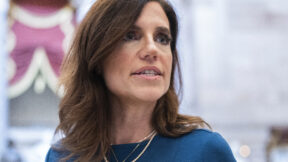Comedian Chris Gethard Talks To Mediaite About Finding The Future Of Entertainment Via Public Access TV
Mediaite: You have the old school TV thing that gets the callers, but you also have the internet, social media aspect that builds a community. There seems to be a melding of old school and new technology.
Gethard: Yeah, I hope people discover it, I feel like in a weird way I don’t want to be too big for my britches by a long shot, but it seems like in the next three, five, 10 years, isn’t that what apple’s trying to do anyways? When you get Netflix Instant, aren’t people starting to realize that TV is just not going to be a thing too far in the future. All of our entertainment is going to be merged on to the Internet. It’s happening with radio already, that’s what podcasting is. And you’re seeing that a lot of the radio shows like This American Life explodes via it’s podcast that’s replays of its radio shows. The Best Show on WFMU is on a cult station in New Jersey and is a great show that exploded once the Internet became a thing. I feel like that’s the radio taking over, becoming part of the internet.
Mediaite: No one wants anything that they can’t get when they want it.
Gethard: Right, On Demand, it’s a thing.
Mediaite: But On Demand and DVR and everything else do take away the communal atmosphere of everyone enjoying a certain piece of entertainment at the same time.
Gethard: Yeah, whereas with us —
Mediaite: You have both.
Gethard: I feel like, at some point in the future, all television will be something you watch that could have, like, click here to join a chatroom about this show while you watch it. I feel like that’s just what it’s going to be at some point. Isn’t that why shows like The Wire and Mad Men and Breaking Bad, like the most incredible, well-made shows are the ones that still get respect. But then you have all this shit like the Real Housewives and Jersey Shore. And isn’t that just built, aren’t those shows like just built for people to be like “Just keep tweeting and your tweets will show up on the screen while you watch it.” Don’t these feel like, sort of sugar rush, not well-thought out television that’s all built on “You participate, you’re a part of it.”
Mediaite: Well, through social media, people have been taught that they are important enough. They’ve been taught that their thoughts deserve to be heard by everyone. And so there will be a full generation of people who think, “I’m watching a show, I think this, the show should say what I think.”
Gethard: I would like to think that. I think what we’re doing with the public access show, if we do it right and if we can actually get it to catch on, maybe someday in the future people will look back and be like “That was like the fucking Wright Brothers, shitty-plane version skeleton.” Because we first realized it through the stage show, if me and my buddy Will Hines start this feud on stage and, in between our shows all month, we’re posting videos of us taking pot shots and making fun of each other, then all these people start leaving comments and saying like “I like Will better. I like Chris better.” And then all those people would show up at the show, you know? And it was like, “Oh, we make these people feel like they can be a part of it.” And then being an audience member doesn’t feel passive.
“I’ve been doing comedy in New York for like 11 years now, but you can see just the influence of the Internet even in that time. I think people will look back on this as a joyful time where it’s like no one knew how to make money off of it yet so it was just do what you want, try what you want. You can’t really fail.”
I think, with the TV show — I don’t know how because I’ve never done this but I just have a feeling that, if we say “Show up in a costume and we’ll invite you back every week.” If you call up, we’ll let you know like, “Here’s your stake in the show.” If you call a few times, we’ll get to know you. It could really become a thing that’s like a combination of television and the Internet and the phone lines that are all these different mediums that butt heads.
Really what the show should be is sort of like a community center for this fucked up community of nerds with nothing better to do. If you have nothing better to do on a Wednesday from 11-midnight eastern time, then you should be a part of this community, which I think is always what the internet has been great at. I want it to feel almost like a message board. Those things are kind of dying now but ten years ago that’s what the internet was. You’d go on a message board and even if you were just lurking you would be like “Oh, it’s that fucking guy. That guy never shuts the fuck up, man. This guy posts ten times a day.” I want it to be that thing where people are like, “That guy Walter is calling up again? Why does he say that? That guy calls up all the time and they love him. I don’t get it!” I want people to debate it. That’s one of my favorite things.
On Twitter this big thing broke out a couple weeks ago where some girl said, “I hate the Human Fish, I don’t think it’s funny. Why do you like it?” And all these other people were like “No, the human fish is the shit, man. You gotta love the human fish.” And then it became this thing where people were basically saying if like the human fish or not. That’s cool that we have this insane bit, a man who is half man and half fish and we never explain what we’re talking about. All these people are feeling that, because they watch this thing now they can go on and tweet at him. “I think you suck”. But it’s self contained. It’s intentional. It’s something we harbor and contain and validate and ask for. It’s not just like they troll us. It’s like, let’s get this debate going, maybe someday you’ll be on the show to stand by this opinion. Why not? But I like that chaos. I like the idea of organizing that chaos using all these different media platforms to sort of barely be in control with it.
It feels like comedians are the ones who have figured it out. It feels like the internet right now is for comedy what college radio was for music in the mid to late 80’s, early 90’s. Look at a comedian like Rob Delaney whose a great comedian but who has like advanced how many people know him exponentially just through Twitter. For me it’s like the same thing as when The Replacements started getting played on college radio. What’s the difference really?
Mediaite: Just the idea of retweeting, reblogging, sending out the email, comedy works well with being spread virally. You rarely get a great viral drama.
Gethard: And the best part is that nobody’s figured out how to make money off of it yet, really. It kinda sucks in the sense that all these comedians are like, “Man, I got 350 retweets” and it’s like, “so what?” “Well, you don’t get it, man. That gives me like 200 new followers in a day, motherfucker.” And it’s like, it doesn’t really matter. There’s some frustration there of all this stuff making money but, creativity wise, it’s just, to me…
I haven’t been around that long. I’ve been doing comedy in New York for like 11 years now, but you can see just the influence of the Internet even in that time. I think people will look back on this as a joyful time where it’s like no one knew how to make money off of it yet so it was just do what you want, try what you want. You can’t really fail. That’s another great thing about the Internet like if we do this show for a year and it doesn’t work it will just be a whole bunch of Internet videos that will have like a thousand views each. There’s no true failing on the internet. It’s not like you can get cancelled on the internet. It’s a very interesting time.
The Chris Gethard Show airs on Manhattan Neighborhood Network at 11pm on Wednesdays. It also streams live on UStream.




